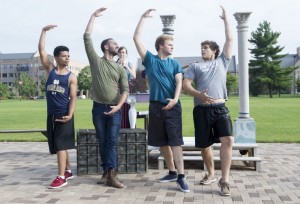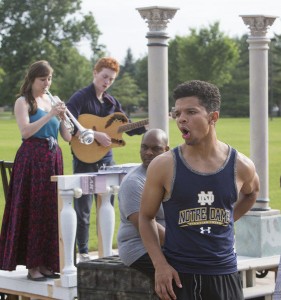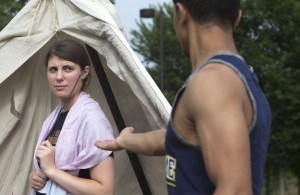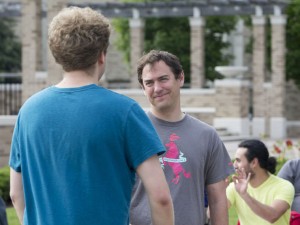
From left, Xavier Bleuel, Anthony Murphy, Quint Mediate and Damian Leverett perform a ballet scene Thursday, July 9, 2015, during rehearsal outside the DeBartolo Performing Arts Center for the upcoming Notre Dame Shakespeare Festival’s Young Company production of “Love’s Labor’s Lost.” SBT Photo/GREG SWIERCZ

Xavier Bleuel sings as musicians play behind him in this scene from the Notre Dame Shakespeare Festival’s Young Company production of “Love’s Labor’s Lost” that opens Sunday in Valparaiso and travels to area outdoor venues through Aug. 24. SBT Photo/GREG SWIERCZ

From left, Xavier Blevel, Anthony Murphy, Quint Mediate and Damian Leverett perform a ballet scene Thursday, July 9, 2015, during rehearsal outside the DeBartolo Performing Arts Center for the upcoming Notre Dame Shakespeare Festival’s Young Company production of “Love’s Labor’s Lost.” SBT Photo/GREG SWIERCZ
It shouldn’t count as a spoiler to reveal Love’s Labor’s Lost doesn’t end with one or more marriages. The play’s title means, after all, love’s labor is lost. And in that respect, the play, this year’s Notre Dame Shakespeare Festival Young Company production, is unique among William Shakespeare’s comedies.
“In all of his other plays about wooing, it ends with the men getting the women,” director West Hyler says. “It’s a war of wooing in which the men are conquerors.”
Here, the men still see themselves as warriors, but Hyler thinks the play’s nontraditional ending fits perfectly with its main characters. “These lovers are immature,” he says. “You cannot love until you have grown up. What happens at the end of the play is they grow up.”
Hyler, who joined NDSF last year to direct the Young Company’s production of The Merry Wives of Windsor, has staged nine productions of Jersey Boys on five continents, directed circuses and has a background in classical theater, an interest that drew him to work with NDSF and the Young Company. The troupe consists of about 20 students from around the country who audition to take classes, produce their own play that they perform in area parks, and be cast and crew members for NDSF’s main stage production, which is The Winter’s Tale this year.
Fittingly for a Young Company production, scholarly pursuits set the plot in motion in Love’s Labor’s Lost, which scholars believe Shakespeare wrote in 1595 or ’96; they know it was performed in 1597. The play takes place at the court of Ferdinand of Navarre, where the king and three of his noblemen — Berowne, Longaville and Dumaine — have taken an oath to forswear women and other pleasures to devote themselves to three years of study in an effort to make the court a renowned academy. The Princess of France, however, arrives with three noblewomen — Rosaline, Maria and Katherine — and the men all fall in love with the ladies.

Abigail Schnell and Xavier Bleuel rehearse a scene for the Notre Dame Shakespeare Festival’s Young Company production of “Love’s Labor’s Lost” that opens Sunday in Valparaiso and plays at area outdoor venues through Aug. 24. SBT Photo/GREG SWIERCZ
To Hyler, the play has a “collegiate feel,” so he’s updated it to the 1890s and set it at a fictional Midwestern university, the University of Navarre, with the women coming from a sister school in Quebec.
“I think of it as the Smith girls go to Harvard,” he says. “I thought it was a great choice (for the Young Company), because it takes place in this fraternal bond of the boys and this sisterhood of the women. I recognized it was more or less a college romance… Loves grow very quickly, the love reaches a fever pitch quickly, and it fades quickly.”
The men’s oath, however, restricts them from courting the women in an overt manner.
“It’s a boy thing to do,” Hyler says, “to keep an oath despite all intelligence to the contrary.”
At the July 8 Beyond the Stage: Explore Love’s Labor’s Lost program, the four actors who play the king and his noblemen performed Act IV, Sc. 3, which the cast and crew have nicknamed “Bro-etry in Poetry” because it depicts each of the male suitors reciting a sonnet he’s written about the object of his attraction, with each of them thinking he’s alone and undetected by the others. The scene has a brilliant energy and hilarious joy to it while demonstrating how precisely Shakespeare’s words and the student’s performances make each of the men distinct characters. “On this one, it moves very, very fast, almost like a runaway train,” Hyler says about the play as a whole, but he could just as easily be referring that scene in particular. “The language is incredibly rich in this. It’s full of witty repartee, almost like a Noel Coward or Oscar Wilde.”

Director West Hyler, center, speaks to actor Quint Mediate during a rehearsal outside for this year’s Notre Dame Shakespeare Festival’s Young Company production of “Love’s Labor’s Lost.” SBT Photo/GREG SWIERCZ
Between scenes, Hyler has selected several works by 19th-century French composer Jacques Offenbach for the students to perform on violin, viola, trumpet, guitar and other instruments. “It allows the world to be set,” he says, and for the audience “to slow down at times to think about what you’ve seen and sort of have a palate cleanser before the next course in this feast of language.” The music serves as a transition, but “also to advance the plot,” Hyler says. “It’s diegetic; in other words, it’s being played as if it’s inside this world.”
But the play’s world also has reality as part of it. At the end, the princess learns her father has died, and she and her court prepare to return to France. The women tell the men they’ll have to wait one year to prove their love for them is true before they will marry Ferdinand and his friends. “It brings the reality of adulthood and responsibility and mortality into the world,” Hyler says about the unusual ending. “When a parent dies, you inherit the mantle of responsibility,” he says. “While your parents are alive, you sort of have a ticket to be irresponsible… They don’t win the labor they have put forward in the pursuit of love, but they have shed some of their immaturity.”
— by Andrew S. Hughes for the South Bend Tribune (July 16, 2015)

Test